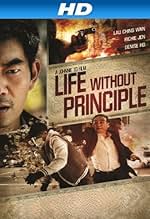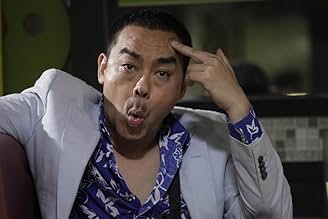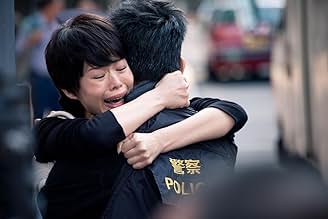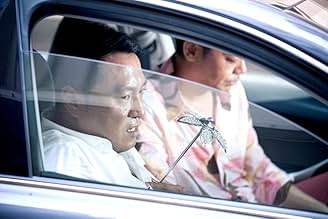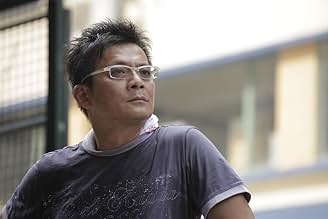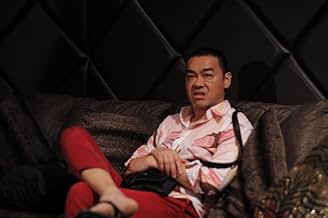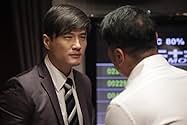IMDb-BEWERTUNG
6,9/10
2872
IHRE BEWERTUNG
Füge eine Handlung in deiner Sprache hinzuThree people - a criminal, a bank officer and a cop - end up in a catastrophic situation in the midst of a global economical crisis and are forced to betray any morals and principles to solv... Alles lesenThree people - a criminal, a bank officer and a cop - end up in a catastrophic situation in the midst of a global economical crisis and are forced to betray any morals and principles to solve their financial problems.Three people - a criminal, a bank officer and a cop - end up in a catastrophic situation in the midst of a global economical crisis and are forced to betray any morals and principles to solve their financial problems.
- Auszeichnungen
- 17 Gewinne & 28 Nominierungen insgesamt
Ching-Wan Lau
- Panther
- (as Ching Wan Lau)
Richie Jen
- Inspector Cheung
- (as Richie Ren)
Eddie Cheung
- Wah
- (as Siu-Fai Cheung)
Siu-Kay Lee
- Brother Four
- (as Siu-Kei Lee)
Empfohlene Bewertungen
10lyx-1
I really don't understand the low ratings for this superb film. This is one of the most brilliant films about the current state of the world as reflected in Hong Kong society I've seen, especially as an indictment against the financial markets and banks, as exemplified in the cold reptilian nature of the female banker. The non-plot is seamlessly woven, though there's a tribute to Kieslowski here, and To coaxed great performances from most of his cast. The interwoven lives are gripping in their own roller-coaster way, as fortunes ride up and down not unlike the stock market. The only disappointment for me was the ending - I did not expect that of To, but again, it could have been the nod to Kieslowski that he wrapped it up the way he did.
Crime drama surrounding financial crisis's , with classic Johnnie To themes ...
------- Movie follows multiple characters (officer, bank clerk, gangster) connected to a loan shark's death . 10 million dollars are missing in the process ..
Same time officer's wife and their foster child are looking for a home in an unstable housing market.. The bank clerk is signing people up for high-risk investments that are bound to fail.. And the gangster has luck for being the bail-out service boy , sole purpose to bail other gangsters out of the trouble they cause for themselves ..
Some investigating, robberies, car break-ins, funny police arrests, rose-petal daggers, stolen money femme ...... Johnnie To elements ..
7/10
------- Movie follows multiple characters (officer, bank clerk, gangster) connected to a loan shark's death . 10 million dollars are missing in the process ..
Same time officer's wife and their foster child are looking for a home in an unstable housing market.. The bank clerk is signing people up for high-risk investments that are bound to fail.. And the gangster has luck for being the bail-out service boy , sole purpose to bail other gangsters out of the trouble they cause for themselves ..
Some investigating, robberies, car break-ins, funny police arrests, rose-petal daggers, stolen money femme ...... Johnnie To elements ..
7/10
Pale color background, 70's and 80's scene set-up, steady frame shot, constant tempo, dramatic directing and acting; the film is full of old day's sentiments, yet it's a story happening in the overwhelmingly prosperous year 2010. Such a misplacement to reflect the most confusing and unbreakable issue that is troubling everyone in the metropolis gives a strong implication of a totally turning upside down era where boundary between right and wrong doesn't exist anymore. Things realigned according to past social order cannot stand the wave of time change; social value, moral standard, principle are all becoming useless and destroyed. No matter how hard one tries to reset it, it's no more than a joke that nobody would pay attention.
As people are turning to a dead end corner, surprises might turn up to help. On the other hand, those who think they can figure out everything not losing a penny might not be as wise as they presume they are, or somehow be ruined by their wisdom. Lo and Keung thought they are the winner of the game; even though they persist until the last breath, their fatal ending wouldn't change. Denise Ho and Lau, playing honest roles ever, should have been the loser of the game, but thanks to an accident, they both live a decent life thereafter without spending an effort. It's not strange or new to see fate or coincidence happening to the characters in Johnny To's film, but being put in a world of misplacement, this time it looks more like an accident than it's under fate, leading to an even more absurd ending where the world is totally unpredictable that one can't reason it. Mankind relies on accident and luck to settle down, that is a laughable grief.
The film, however; doesn't seem to rule out hard work could bring return, at least Wong, the role of recyclable paper collector, has enough significance. Unfortunately just a while later we see an old working class having fallen under the fade-out group of the society trying to kill himself. The script is actually talking to itself debating over the subject. It even further elaborates by condemning through the characters' dialog. The most remarkable one is the confession by JJ Jia in the police station. Her brilliant acting has turned uncontrollably subconscious contradiction within into reasonable greed. What a marvelous demonstration of metropolis ridiculousness!
Sensibility might not win in this battle against absurdity. Richie Ren has been in a terribly confusing state struggling deeply within throughout the entire film. Not to mention the incidents he faces as a police inspector, he has yet to deal with a lot of personal problems such as his wife's persistence to purchase an apartment under the high market price, a seriously sick father and the sudden arrival of a younger sister by the mysterious wife of his father. These, however; are not dramatic enough to constitute irony effect, so the director has to arrange his wife coming to a sudden awakening by seeing him would die as the ending of the story. All these have come together too fast that Richie Ren is unable to react. He acts in such a slow-reflex way that has conveyed his thoughts of questioning "what's going on with my fate?" He rather believes it's all a coincidence. By taking away one's fate, he loses control over his life and all that left to him is coincidence. He has to pray for this for the rest of his life.
Although the script is full of condemns to reality, the director has remained himself as an outsider with a very calm view over what is happening. The shots are all apathetic, just like people ignoring what is happening around them every day. This metaphor is too good, really too good that it might need another accidental coincidence to wake up the audiences before they would even notice it.
As people are turning to a dead end corner, surprises might turn up to help. On the other hand, those who think they can figure out everything not losing a penny might not be as wise as they presume they are, or somehow be ruined by their wisdom. Lo and Keung thought they are the winner of the game; even though they persist until the last breath, their fatal ending wouldn't change. Denise Ho and Lau, playing honest roles ever, should have been the loser of the game, but thanks to an accident, they both live a decent life thereafter without spending an effort. It's not strange or new to see fate or coincidence happening to the characters in Johnny To's film, but being put in a world of misplacement, this time it looks more like an accident than it's under fate, leading to an even more absurd ending where the world is totally unpredictable that one can't reason it. Mankind relies on accident and luck to settle down, that is a laughable grief.
The film, however; doesn't seem to rule out hard work could bring return, at least Wong, the role of recyclable paper collector, has enough significance. Unfortunately just a while later we see an old working class having fallen under the fade-out group of the society trying to kill himself. The script is actually talking to itself debating over the subject. It even further elaborates by condemning through the characters' dialog. The most remarkable one is the confession by JJ Jia in the police station. Her brilliant acting has turned uncontrollably subconscious contradiction within into reasonable greed. What a marvelous demonstration of metropolis ridiculousness!
Sensibility might not win in this battle against absurdity. Richie Ren has been in a terribly confusing state struggling deeply within throughout the entire film. Not to mention the incidents he faces as a police inspector, he has yet to deal with a lot of personal problems such as his wife's persistence to purchase an apartment under the high market price, a seriously sick father and the sudden arrival of a younger sister by the mysterious wife of his father. These, however; are not dramatic enough to constitute irony effect, so the director has to arrange his wife coming to a sudden awakening by seeing him would die as the ending of the story. All these have come together too fast that Richie Ren is unable to react. He acts in such a slow-reflex way that has conveyed his thoughts of questioning "what's going on with my fate?" He rather believes it's all a coincidence. By taking away one's fate, he loses control over his life and all that left to him is coincidence. He has to pray for this for the rest of his life.
Although the script is full of condemns to reality, the director has remained himself as an outsider with a very calm view over what is happening. The shots are all apathetic, just like people ignoring what is happening around them every day. This metaphor is too good, really too good that it might need another accidental coincidence to wake up the audiences before they would even notice it.
"Life Without Principle" ("Dyut Meng Gam") was nothing at all what I had expected it to be. Was it better than I had anticipated? No, hardly so.
As much as I enjoy Hong Kong cinema, then this movie failed to utterly embrace and capture my liking. Why? Well, I guess it was because the movie tried to tell different tales that were spinning around the same axis - an axis that was a bag with 5 million Hong Kong dollars - but ultimately failed to wrap all stories up in a satisfying way.
Ching Wan Lau (playing Panther) really carried the movie most of the time and did a good job with his portrayal of a rather twitchy and edgy guy in the Hong Kong gangster milieu. But also Denise Ho (playing Teresa) put on a memorable performance in the movie. Richie Ren (playing inspector Cheung) was also doing a good job. Terence Yin (playing Mr. Sung) could have use a lot more screen-time, because his role was too small and had potential to bring something greater to the movie had he been given the chance.
There were aspects of the movie that were great, but in overall the movie didn't fully deliver. And of course, it is not all Hong Kong movies that bring the goods to the table, and for me, then "Life Without Principle" failed to do so miserably on some levels.
I doubt that I will ever put this movie on again for a second watching, as it just doesn't have that much leverage or that much to offer. Director Johnnie To has far better movies to his directing career.
As much as I enjoy Hong Kong cinema, then this movie failed to utterly embrace and capture my liking. Why? Well, I guess it was because the movie tried to tell different tales that were spinning around the same axis - an axis that was a bag with 5 million Hong Kong dollars - but ultimately failed to wrap all stories up in a satisfying way.
Ching Wan Lau (playing Panther) really carried the movie most of the time and did a good job with his portrayal of a rather twitchy and edgy guy in the Hong Kong gangster milieu. But also Denise Ho (playing Teresa) put on a memorable performance in the movie. Richie Ren (playing inspector Cheung) was also doing a good job. Terence Yin (playing Mr. Sung) could have use a lot more screen-time, because his role was too small and had potential to bring something greater to the movie had he been given the chance.
There were aspects of the movie that were great, but in overall the movie didn't fully deliver. And of course, it is not all Hong Kong movies that bring the goods to the table, and for me, then "Life Without Principle" failed to do so miserably on some levels.
I doubt that I will ever put this movie on again for a second watching, as it just doesn't have that much leverage or that much to offer. Director Johnnie To has far better movies to his directing career.
The long-gestating Johnnie To movie 'Life Without Principle' chooses as its theme the interminable greed of mankind, set against the backdrop of the current financial crisis. Taking almost three years for the auteur to get it off the page onto the screen, it is also his most narratively complex film since 'Election', intertwining the stories of a bank employee, a cop and two triad gangsters over the course of one fateful day when the Greek economy essentially goes 'kaput'.
Unfolding quite independently of each other at first, To requests the patience of his audience as he slowly builds up each narrative thread to flesh out the key characters. First in line is bank employee Teresa (Denise Ho), who is under pressure from the team manager to meet her sales targets for a new complex financial product before the New Year. She makes cold calls from a list of bank customers, the derision she faces enough to make one think twice about being mean to the person on the other end of the line in similar real-life situations.
The focus of this segment is Teresa's persuasion of an elderly woman (So Hang-Shuen) to invest her life savings into a high-risk fund, despite the mismatch between the investment product and the client's risk appetite. The client laments about the bank's low interest rates on deposits, and Teresa sees an opportunity to be less than scrupulous- despite her nagging conscience. This is certainly a parallel between this and our very own DBS 'High Notes 5' saga not too long ago- and To mines the realities of this sequence to highlight the pitfalls many ordinary citizens often fall into when making poorly informed investment decisions.
To also uses this segment to introduce two supporting characters- the balding loan shark Yuen (Lo Hoi-Pang) who gets robbed immediately after withdrawing five million from the bank; and the soon-to-be-married Connie (Myolie Wu) frustrated at her fiancée's reluctance at buying an apartment for investment. Yuen will figure later in the second story thread led by triad runner Panther (Lau Ching Wan) and his buddy Lung (Philip Keung), who runs an illegal business operation dabbling in Internet stock trading.
Thanks to Lau's fine turn playing the exceedingly righteous Panther with just the right balance of levity and gravity, this is easily the most colourfully entertaining segment- and because of the gangster milieu also the one which To's fans will find most familiar. Using the first half to emphasise Panther's servility as he tries to post bail for a fellow triad honcho (Eddie Cheung), To's investment in character development pays off in understanding Panther's loyalty to Lung and the extent he is willing to go to help Lung out of his financial doldrums.
The third, and perhaps least developed, story concerns Inspector Cheung (Ritchie Jen), whose dedication to his work is another reason for his fiancé Connie's frustration. Though Cheung is seen earlier crossing paths with Panther, it is Cheung's heroism saving another elderly man from committing suicide and his subsequent change in perspective that this segment is concerned with- though there Is a severely undercooked subplot involving Cheung's father's death from cancer and the fate of his young half-sister. This and the other two seemingly disparate plot threads only coalesce towards the last half hour of the film- but rest assured that To rewards your patience with a riveting conclusion that connects the various characters brilliantly, albeit with some degree of deus ex machina especially towards the end.
But beyond the plotting, To's film is also extremely meaningful as a reflection of the interconnectedness of our livelihoods with the ups and downs of the world economy. Bearing great thematic relevance and prescience, the movie paints a stark picture of how the very wellbeing of ordinary and disparate folk can be affected so drastically by something happening on a different continent. It is also not afraid to expose the flaws within the growing complexities of our financial industries, which entraps the sweat-soaked dollars and cents of good hardworking people.
If the above discourse on the film's themes isn't yet clear enough, then let us also state categorically that those looking for To's trademark shoot-em-up actioners will likely be disappointed. There is nary a shootout in sight, nor a bullet fired for that matter, but To's gamble to attempt a multi-strand narrative built around pertinent social issues (think 'Traffic', 'Crash' or even this autumn's 'Contagion') pays off handsomely- thanks also to solid acting from To's usual band of regulars and some expert editing from David Richardson. As the fruit of To's labour for the past three years, it also reaffirms his position as one of the best, if not the best, directors in Hong Kong today.
Unfolding quite independently of each other at first, To requests the patience of his audience as he slowly builds up each narrative thread to flesh out the key characters. First in line is bank employee Teresa (Denise Ho), who is under pressure from the team manager to meet her sales targets for a new complex financial product before the New Year. She makes cold calls from a list of bank customers, the derision she faces enough to make one think twice about being mean to the person on the other end of the line in similar real-life situations.
The focus of this segment is Teresa's persuasion of an elderly woman (So Hang-Shuen) to invest her life savings into a high-risk fund, despite the mismatch between the investment product and the client's risk appetite. The client laments about the bank's low interest rates on deposits, and Teresa sees an opportunity to be less than scrupulous- despite her nagging conscience. This is certainly a parallel between this and our very own DBS 'High Notes 5' saga not too long ago- and To mines the realities of this sequence to highlight the pitfalls many ordinary citizens often fall into when making poorly informed investment decisions.
To also uses this segment to introduce two supporting characters- the balding loan shark Yuen (Lo Hoi-Pang) who gets robbed immediately after withdrawing five million from the bank; and the soon-to-be-married Connie (Myolie Wu) frustrated at her fiancée's reluctance at buying an apartment for investment. Yuen will figure later in the second story thread led by triad runner Panther (Lau Ching Wan) and his buddy Lung (Philip Keung), who runs an illegal business operation dabbling in Internet stock trading.
Thanks to Lau's fine turn playing the exceedingly righteous Panther with just the right balance of levity and gravity, this is easily the most colourfully entertaining segment- and because of the gangster milieu also the one which To's fans will find most familiar. Using the first half to emphasise Panther's servility as he tries to post bail for a fellow triad honcho (Eddie Cheung), To's investment in character development pays off in understanding Panther's loyalty to Lung and the extent he is willing to go to help Lung out of his financial doldrums.
The third, and perhaps least developed, story concerns Inspector Cheung (Ritchie Jen), whose dedication to his work is another reason for his fiancé Connie's frustration. Though Cheung is seen earlier crossing paths with Panther, it is Cheung's heroism saving another elderly man from committing suicide and his subsequent change in perspective that this segment is concerned with- though there Is a severely undercooked subplot involving Cheung's father's death from cancer and the fate of his young half-sister. This and the other two seemingly disparate plot threads only coalesce towards the last half hour of the film- but rest assured that To rewards your patience with a riveting conclusion that connects the various characters brilliantly, albeit with some degree of deus ex machina especially towards the end.
But beyond the plotting, To's film is also extremely meaningful as a reflection of the interconnectedness of our livelihoods with the ups and downs of the world economy. Bearing great thematic relevance and prescience, the movie paints a stark picture of how the very wellbeing of ordinary and disparate folk can be affected so drastically by something happening on a different continent. It is also not afraid to expose the flaws within the growing complexities of our financial industries, which entraps the sweat-soaked dollars and cents of good hardworking people.
If the above discourse on the film's themes isn't yet clear enough, then let us also state categorically that those looking for To's trademark shoot-em-up actioners will likely be disappointed. There is nary a shootout in sight, nor a bullet fired for that matter, but To's gamble to attempt a multi-strand narrative built around pertinent social issues (think 'Traffic', 'Crash' or even this autumn's 'Contagion') pays off handsomely- thanks also to solid acting from To's usual band of regulars and some expert editing from David Richardson. As the fruit of To's labour for the past three years, it also reaffirms his position as one of the best, if not the best, directors in Hong Kong today.
- www.moviexclusive.com
Wusstest du schon
- WissenswertesDebuted at the second spot of the Hong Kong box office and held the position in its second week.
- VerbindungenReferenced in Mo ngai: To Kei Fung dik din ying sai gaai (2013)
Top-Auswahl
Melde dich zum Bewerten an und greife auf die Watchlist für personalisierte Empfehlungen zu.
- How long is Life Without Principle?Powered by Alexa
Details
- Erscheinungsdatum
- Herkunftsland
- Offizielle Standorte
- Sprache
- Auch bekannt als
- Life Without Principle
- Produktionsfirmen
- Weitere beteiligte Unternehmen bei IMDbPro anzeigen
Box Office
- Weltweiter Bruttoertrag
- 1.203.873 $
- Laufzeit1 Stunde 47 Minuten
- Farbe
- Sound-Mix
- Seitenverhältnis
- 2.35 : 1
Zu dieser Seite beitragen
Bearbeitung vorschlagen oder fehlenden Inhalt hinzufügen




